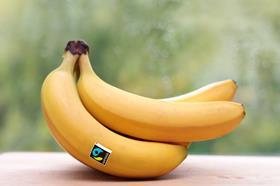
Fairtrade banana sales grew by six per cent between 2015 and 2016 despite a tough grocery market and the declining value of the pound, the organisation has said.
The figures mean bananas saw the second-highest sales growth in Fairtrade products over the year behind coffee, which grew by eight per cent.
Fairtrade sales as a whole bucked the contracting grocery market trend, with increased volumes resulting in financial premiums of around £30 million (up £5m on the previous year) that will go to producers in Africa, Asia, Latin America and the Caribbean.
Fairtrade Foundation CEO Michael Gidney said: “Despite all the challenges and turbulence of 2016 which has seen the grocery market contract and the pound plummet shoppers are still supporting Fairtrade to deliver a better deal for the farmers who grow some of our favourite ingredients.
“Growth in some of our most iconic products such as bananas and coffee have continued, whilst new additions show the continued desire to make trade fair.”
Gidney noted other highlights of the year, including fast food chain Greggs increasing their commitment and start selling Fairtrade coffee, tea and bananas and herbal teas.
The initial estimate for the overall retail value of the Fairtrade market 2016 suggests an increase of two per cent.
”As the traditional market continues to mature it’s exciting to see how new firms pick up the Fairtrade ideals and implement them. The support and desire for Fairtrade continues, and that, like the figures, speaks volumes for the future,” Gidney added.
The news comes as Fairtrade unveiled a provocative new video to help consumers understand the consequences of low prices in the supply chain.
It features a ‘fake’ delivery service offering bargain home grocery deliveries, and then films shoppers’ reactions when products are delivered by young black children.
Gidney said: “Too many companies still do not publish what they pay their producers. It’s time to really push the direct connection between the food we buy and their impact on farmers’ livelihoods. If people really knew, and thought about it, would they still make the same choices?”



